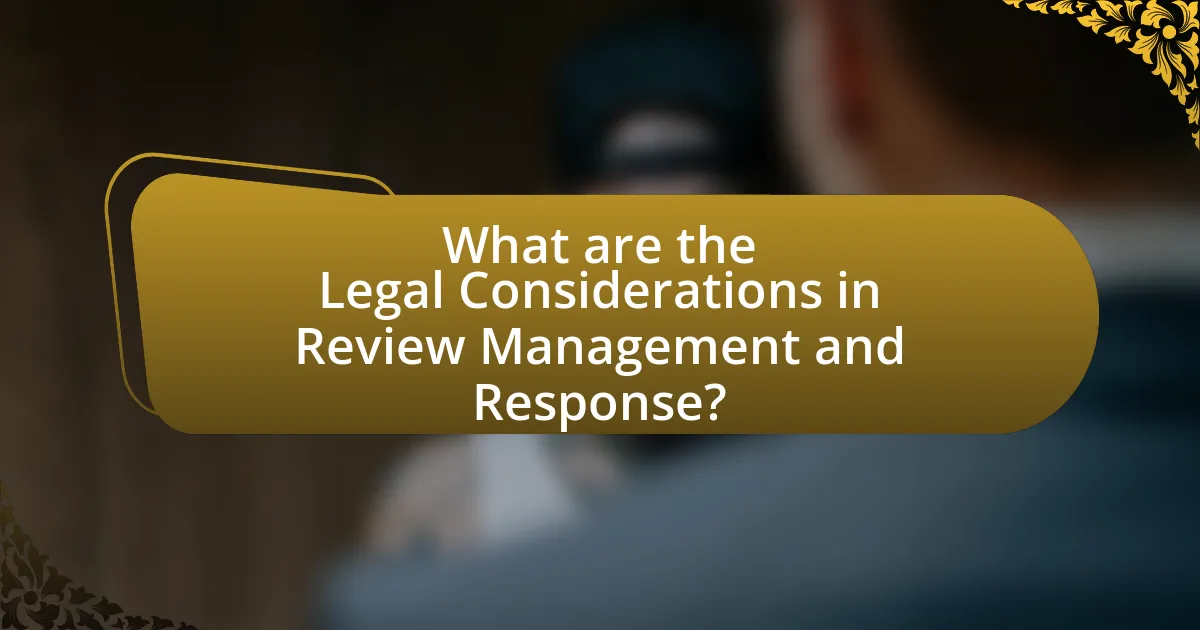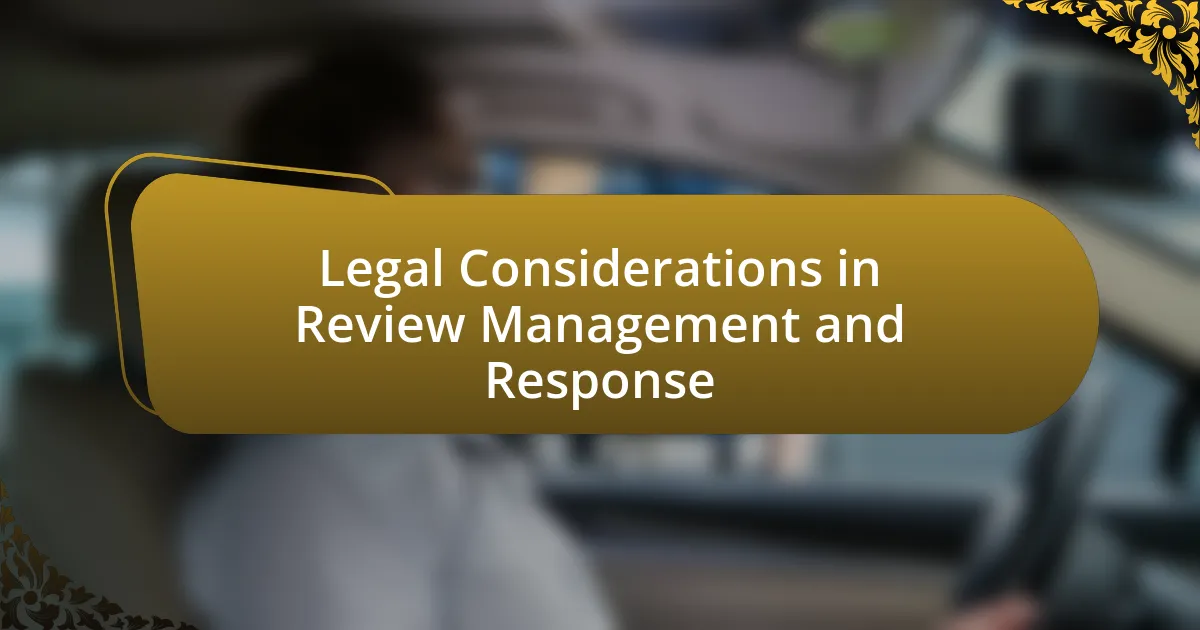The article focuses on the legal considerations in review management and response, emphasizing the importance of compliance with defamation laws, consumer protection regulations, and privacy laws. It outlines the potential legal risks businesses face, such as defamation and false advertising, and discusses the frameworks that govern review practices, including the Federal Trade Commission guidelines. Additionally, the article highlights best practices for responding to reviews, the role of legal teams in managing risks, and the implications of recent legal developments on review management strategies. Key takeaways include the necessity for businesses to adopt ethical practices and proactive compliance measures to mitigate legal challenges associated with user-generated content.

What are the Legal Considerations in Review Management and Response?
Legal considerations in review management and response include compliance with defamation laws, consumer protection regulations, and privacy laws. Businesses must ensure that their responses do not contain false statements that could harm an individual’s reputation, as this could lead to defamation claims. Additionally, under the Federal Trade Commission (FTC) guidelines, companies must disclose any material connections when responding to reviews, especially if incentivized. Privacy laws, such as the General Data Protection Regulation (GDPR), require businesses to handle personal data responsibly, ensuring that any identifiable information in reviews is managed in compliance with legal standards. These considerations are crucial for mitigating legal risks and maintaining a positive brand image.
Why is understanding legal considerations important in review management?
Understanding legal considerations is crucial in review management because it helps organizations navigate potential liabilities and compliance issues. Legal frameworks, such as defamation laws and consumer protection regulations, dictate how businesses can respond to reviews without risking legal repercussions. For instance, a study by the American Bar Association highlights that improper handling of negative reviews can lead to lawsuits, emphasizing the need for businesses to be aware of their legal rights and obligations when managing customer feedback.
What legal frameworks govern review management practices?
Legal frameworks governing review management practices include consumer protection laws, defamation laws, and regulations related to false advertising. Consumer protection laws, such as the Federal Trade Commission Act in the United States, prohibit deceptive practices and require businesses to ensure that reviews are not misleading. Defamation laws protect individuals and businesses from false statements that could harm their reputation, which is crucial in managing online reviews. Additionally, regulations like the CAN-SPAM Act and GDPR impose requirements on how businesses can solicit and manage reviews, ensuring transparency and consent in the process. These frameworks collectively guide businesses in maintaining ethical and legal standards in their review management practices.
How do legal considerations impact business reputation?
Legal considerations significantly impact business reputation by influencing public perception and trust. When a business adheres to laws and regulations, it fosters a positive image, while legal violations can lead to negative publicity and loss of customer confidence. For instance, companies facing lawsuits or regulatory penalties often experience a decline in reputation, as seen in cases like Volkswagen’s emissions scandal, which resulted in a substantial drop in consumer trust and market value. Furthermore, compliance with consumer protection laws enhances credibility, as businesses that prioritize legal standards are viewed as more reliable and ethical by consumers.
What are the potential legal risks associated with review management?
The potential legal risks associated with review management include defamation, false advertising, and violation of consumer protection laws. Defamation occurs when a business responds to a review in a way that falsely damages the reputation of the reviewer or another party, which can lead to lawsuits. False advertising risks arise when businesses manipulate reviews or create fake ones, misleading consumers and violating regulations enforced by agencies like the Federal Trade Commission. Additionally, failing to comply with consumer protection laws, such as the requirement to disclose incentivized reviews, can result in legal penalties. These risks highlight the importance of adhering to ethical practices in review management to avoid legal repercussions.
What constitutes defamation in the context of reviews?
Defamation in the context of reviews occurs when a false statement is made about an individual or business that damages their reputation. For a statement to be considered defamatory, it must be presented as a fact rather than an opinion, be untrue, and cause harm to the subject’s reputation. Legal standards for defamation vary by jurisdiction, but generally, the plaintiff must prove that the statement was made with negligence or actual malice, particularly if the subject is a public figure. In the United States, the landmark case New York Times Co. v. Sullivan established that public figures must demonstrate actual malice to win a defamation case, which requires showing that the statement was made with knowledge of its falsity or with reckless disregard for the truth.
How can businesses avoid liability for user-generated content?
Businesses can avoid liability for user-generated content by implementing clear content moderation policies and actively monitoring user contributions. Establishing guidelines for acceptable content helps set expectations for users and provides a framework for moderation. Additionally, promptly addressing and removing any harmful or infringing content can demonstrate a proactive approach to managing user-generated content. Legal protections, such as the Communications Decency Act in the United States, provide some immunity for platforms that engage in good faith moderation. By documenting moderation efforts and maintaining transparency with users, businesses can further mitigate potential legal risks associated with user-generated content.
What role does consumer protection law play in review responses?
Consumer protection law plays a crucial role in shaping review responses by ensuring that businesses provide truthful and non-deceptive information in their replies. This legal framework mandates that companies must not misrepresent their products or services in response to consumer reviews, as doing so could lead to legal repercussions under statutes such as the Federal Trade Commission Act in the United States. For instance, if a business responds to a negative review by falsely claiming that a product has been improved or that customer complaints are unfounded, it risks facing penalties for misleading advertising. Thus, adherence to consumer protection laws not only fosters trust between businesses and consumers but also mitigates the risk of legal challenges.
What are the key consumer protection regulations relevant to reviews?
Key consumer protection regulations relevant to reviews include the Federal Trade Commission (FTC) guidelines, which mandate that endorsements and testimonials must be truthful and not misleading. The FTC requires that any material connection between the reviewer and the product or service must be disclosed, ensuring transparency. Additionally, the Consumer Review Fairness Act prohibits businesses from including clauses in their contracts that restrict customers from leaving honest reviews. These regulations aim to protect consumers from deceptive practices and ensure that reviews reflect genuine experiences.
How can businesses ensure compliance with these regulations?
Businesses can ensure compliance with regulations by implementing a comprehensive compliance program that includes regular training, monitoring, and auditing processes. This program should be tailored to the specific regulations applicable to the industry, such as data protection laws or consumer rights legislation. For instance, according to the General Data Protection Regulation (GDPR), businesses must establish clear data handling procedures and conduct impact assessments to identify risks. Regular audits can help identify compliance gaps, while employee training ensures that all staff understand their responsibilities under the law.

How can businesses effectively manage legal risks in review responses?
Businesses can effectively manage legal risks in review responses by implementing a structured response policy that includes guidelines for content moderation, legal review, and training for staff. Establishing clear protocols ensures that responses do not contain defamatory statements, violate privacy laws, or breach consumer protection regulations. For instance, a study by the American Bar Association highlights that companies with formal review response policies experience fewer legal disputes related to online reviews. Additionally, regularly consulting with legal counsel can help businesses stay updated on relevant laws and regulations, further minimizing potential legal exposure.
What best practices should businesses follow when responding to reviews?
Businesses should respond to reviews promptly, professionally, and personally. Timely responses demonstrate that the business values customer feedback, which can enhance customer loyalty. Professionalism ensures that the business maintains its reputation, even when addressing negative reviews. Personalizing responses by using the reviewer’s name and referencing specific points from their feedback fosters a connection and shows genuine engagement.
Additionally, businesses should avoid defensive or confrontational language, as this can escalate conflicts and damage the brand’s image. Instead, they should acknowledge the customer’s concerns and offer solutions or invite them to discuss the matter further offline. According to a study by BrightLocal, 89% of consumers read businesses’ responses to reviews, indicating that how a business handles feedback can significantly influence potential customers’ perceptions.
How can businesses craft legally sound responses to negative reviews?
Businesses can craft legally sound responses to negative reviews by adhering to specific guidelines that protect their interests while addressing customer concerns. First, they should avoid making false statements or assumptions about the reviewer, as this can lead to defamation claims. Instead, businesses should focus on factual information and express empathy towards the customer’s experience.
Additionally, it is crucial for businesses to refrain from disclosing any private or sensitive information about the customer, as this could violate privacy laws. They should also ensure that their responses do not contain any language that could be interpreted as threatening or aggressive, which could escalate the situation or lead to legal repercussions.
Furthermore, businesses can benefit from consulting legal counsel to review their response policies and ensure compliance with relevant laws, such as the Federal Trade Commission’s guidelines on endorsements and testimonials. By following these practices, businesses can effectively manage negative reviews while minimizing legal risks.
What are the guidelines for responding to positive reviews?
To respond to positive reviews, businesses should express gratitude, personalize the response, and encourage further engagement. Expressing gratitude acknowledges the customer’s experience and fosters loyalty. Personalizing the response by mentioning specific details from the review demonstrates attentiveness and builds a connection. Encouraging further engagement, such as inviting the customer to return or share their experience with others, can enhance community and brand visibility. These guidelines are supported by research indicating that personalized responses can increase customer satisfaction and loyalty, as noted in a study published in the Journal of Marketing Research.
What strategies can mitigate legal risks in review management?
Implementing clear guidelines for review solicitation and response can mitigate legal risks in review management. Establishing a policy that outlines acceptable practices for requesting reviews ensures compliance with regulations, such as the Federal Trade Commission’s guidelines on endorsements and testimonials. Additionally, training employees on these guidelines reduces the likelihood of unintentional violations. Regularly monitoring reviews for compliance and addressing any potentially defamatory content promptly further protects against legal repercussions. These strategies collectively create a framework that minimizes exposure to legal challenges while fostering a transparent review environment.
How can training employees on legal considerations reduce risks?
Training employees on legal considerations can significantly reduce risks by ensuring they understand compliance requirements and the legal implications of their actions. When employees are educated about relevant laws, such as data protection regulations and defamation laws, they are less likely to engage in practices that could lead to legal disputes or penalties. For instance, a study by the Society for Human Resource Management found that organizations with comprehensive training programs experience 50% fewer legal claims compared to those without such training. This highlights the effectiveness of legal training in mitigating risks associated with non-compliance and potential litigation.
What role does a legal team play in review management strategies?
A legal team plays a crucial role in review management strategies by ensuring compliance with laws and regulations governing online reviews. They assess the legal implications of reviews, advise on risk management, and develop policies to mitigate potential legal issues, such as defamation or false advertising claims. For instance, a legal team may analyze customer feedback to identify potentially harmful content and recommend appropriate responses that align with legal standards, thereby protecting the organization from litigation. Their expertise is essential in navigating the complexities of consumer protection laws and maintaining the integrity of the review process.

What are the implications of recent legal developments on review management?
Recent legal developments significantly impact review management by imposing stricter regulations on how businesses handle customer feedback. These changes often require companies to ensure transparency in their review solicitation practices and to avoid manipulating or fabricating reviews, as seen in the Federal Trade Commission’s increased scrutiny on deceptive practices. For instance, the FTC’s guidelines mandate that businesses disclose any material connections with reviewers, which can lead to legal repercussions if ignored. Consequently, organizations must adapt their review management strategies to comply with these regulations, ensuring authenticity and accountability in their customer interactions.
How have recent court rulings affected review management practices?
Recent court rulings have significantly impacted review management practices by establishing clearer guidelines on the legality of soliciting and responding to customer reviews. For instance, rulings have reinforced the importance of transparency and authenticity in reviews, leading businesses to adopt stricter verification processes to ensure that reviews are genuine and not incentivized. Additionally, courts have emphasized the need for businesses to respond to negative reviews in a manner that does not violate defamation laws, prompting companies to train staff on appropriate response strategies. These legal precedents have resulted in a more cautious approach to review management, where businesses prioritize compliance with legal standards to mitigate the risk of litigation.
What are the key takeaways from recent legal cases involving reviews?
Recent legal cases involving reviews highlight the importance of authenticity and transparency in user-generated content. Courts have increasingly ruled that businesses must ensure that reviews are genuine and not misleading, as seen in cases where companies faced penalties for posting fake reviews or incentivizing positive feedback without disclosure. For instance, the Federal Trade Commission has enforced actions against businesses for deceptive practices related to reviews, emphasizing that failure to disclose material connections can lead to legal repercussions. Additionally, cases have underscored the necessity for businesses to monitor and respond to reviews appropriately, as negative reviews can lead to defamation claims if not handled correctly. These rulings collectively stress the need for businesses to adopt ethical review management practices to mitigate legal risks.
How can businesses adapt to changing legal landscapes in review management?
Businesses can adapt to changing legal landscapes in review management by implementing robust compliance strategies that align with current regulations. This includes regularly updating their review policies to reflect new laws, such as data protection regulations like the General Data Protection Regulation (GDPR) and the California Consumer Privacy Act (CCPA), which impose strict guidelines on how customer data is collected and used. Additionally, businesses should invest in training staff on legal requirements and best practices for managing reviews, ensuring that all responses are compliant and respectful of consumer rights. Regular audits of review management practices can also help identify areas of risk and ensure adherence to legal standards, thereby minimizing potential liabilities.
What future trends should businesses anticipate in review management and legal considerations?
Businesses should anticipate increased regulatory scrutiny and evolving legal frameworks in review management. As consumer protection laws tighten globally, companies will face stricter requirements for transparency and authenticity in reviews. For instance, the Federal Trade Commission (FTC) in the United States has been actively updating guidelines to combat fake reviews, which indicates a trend toward more rigorous enforcement. Additionally, the rise of artificial intelligence in generating reviews may lead to legal challenges regarding accountability and authenticity, necessitating businesses to implement robust verification processes. These trends highlight the importance of proactive compliance strategies to mitigate legal risks associated with review management.
How might evolving technology impact legal considerations in reviews?
Evolving technology significantly impacts legal considerations in reviews by introducing new platforms and methods for collecting, sharing, and analyzing consumer feedback. As technology advances, the potential for defamation, false advertising, and privacy violations increases, necessitating stricter compliance with laws such as the Digital Millennium Copyright Act and the General Data Protection Regulation. For instance, the rise of artificial intelligence in generating reviews can blur the lines between authentic consumer feedback and manipulated content, leading to legal challenges regarding authenticity and liability. Additionally, the use of algorithms to filter or promote reviews raises questions about transparency and fairness, which can result in regulatory scrutiny and legal repercussions for businesses.
What proactive measures can businesses take to stay ahead of legal challenges?
Businesses can implement comprehensive compliance programs to stay ahead of legal challenges. These programs should include regular training for employees on relevant laws and regulations, ensuring that all staff are aware of legal obligations and company policies. Additionally, conducting periodic audits of business practices can help identify potential legal risks before they escalate. Establishing clear communication channels for reporting legal concerns and engaging legal counsel for ongoing advice further strengthens a business’s ability to navigate legal complexities. According to a study by the Association of Corporate Counsel, companies with proactive legal strategies experience 30% fewer legal disputes, highlighting the effectiveness of these measures.
What practical tips can businesses implement for effective review management?
Businesses can implement several practical tips for effective review management, including actively monitoring reviews across platforms, responding promptly to both positive and negative feedback, and encouraging satisfied customers to leave reviews. Actively monitoring reviews allows businesses to stay informed about customer sentiments and address issues quickly, which is crucial for maintaining a positive reputation. Responding promptly demonstrates that the business values customer feedback and is committed to improving their experience. Encouraging satisfied customers to leave reviews can enhance the overall rating and provide a more balanced view of the business. According to a 2021 survey by BrightLocal, 79% of consumers trust online reviews as much as personal recommendations, highlighting the importance of managing reviews effectively.
How can businesses create a review response policy that incorporates legal considerations?
Businesses can create a review response policy that incorporates legal considerations by establishing clear guidelines that comply with defamation laws, privacy regulations, and consumer protection statutes. This involves training staff on how to respond to reviews without making false claims or disclosing confidential information, thus minimizing legal risks. For instance, the Federal Trade Commission (FTC) requires that businesses disclose any material connections with reviewers, ensuring transparency and compliance with advertising laws. Additionally, businesses should regularly review and update their policies to reflect changes in legislation and best practices, ensuring ongoing legal compliance.
What tools and resources are available to assist with legal compliance in review management?
Tools and resources available to assist with legal compliance in review management include compliance management software, legal consulting services, and industry-specific guidelines. Compliance management software, such as TrustArc and OneTrust, helps organizations track and manage compliance with regulations like GDPR and CCPA, ensuring that customer reviews are handled according to legal standards. Legal consulting services provide expert advice on navigating complex regulations and can assist in developing policies that align with legal requirements. Additionally, industry-specific guidelines, such as those from the Federal Trade Commission (FTC) regarding endorsements and testimonials, offer clear frameworks for compliant review management practices. These resources collectively support businesses in maintaining legal compliance while managing customer reviews effectively.

Leave a Reply